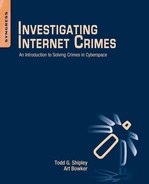Foreword
Current CEO at Castleworth Global LLC, Former Chief Security Officer at Genworth Financial and Special Agent in Charge, Criminal Investigative Division USSS Retired
Cybercrime, security and digital intelligence are important work of great relevance in today's interconnected world and one that nobody with an interest in enforcement, risk or technology should be without. In the mid 1990’s the Secret Service was at the forefront of cybercrime because of its financial crimes and identity theft legal responsibilities to protect the country's financial systems. Almost all cybercriminals at that time were focused on penetrating private sector institutions for financial and personal information. As stated by a Secret Service “target hacker” at the time, “why financial institutions? Because that is where the money is”.
Today's digital economy is even more dependent on the Internet, yet few users or decision makers have more than a rudimentary understanding of the online risks that threaten all of us.
Advances in computer technology and greater access to personal information via the Internet have created a virtual marketplace for transnational cyber criminals to share stolen information and criminal methodologies. As a result, the Secret Service has observed a marked increase in the quality, quantity and complexity of cybercrimes targeting private industry and critical infrastructure. These crimes include network intrusions, hacking attacks, development and use of malicious software, and account takeovers leading to significant data breaches affecting every sector of the world economy. As large companies have adopted more sophisticated protections against cyber-crime, criminals have adapted as well by increasing their attacks against small and medium-sized businesses, banks, and data processors. Unfortunately, many smaller businesses do not have the resources to adopt and continuously upgrade the sophisticated protections needed to safeguard data from being compromised.
From a different perspective, cybercrime is no longer just in a sophisticated hacker's purview. Internet crime can literally be committed by anyone and no one is immune to becoming a victim of an internet crime. The media is full of stories of sex offenders, cyber stalkers, cyber bullies and all manner of Internet malfeasance. Social media is also increasing being used to perpreate all kinds of criminal activity. There are even cases of serial killers going online to stalk and trap their victims. In this day and age who has not received a notice from their financial institution that their personal information may have been compromised and is being offered identity theft insurance and monitoring as a precaution? All investigative departments and agencies now need this expertise available in their investigative toolbox. Internet investigations are therefore necessary law enforcement ability and yet they are fully understood by only a small minority of state and local law-enforcement agencies.
According to federal and state law enforcement officials, the pool of qualified of cyber-crime investigator candidates is limited because those investigating or examining cyber-crime cases must be highly trained specialists, requiring both investigative and technical skills, including knowledge of various IT hardware and software, electronic chain of custody rules and advanced forensic tools.
As more and more sensitive information is stored in cyberspace, target-rich environments are created for both the sophisticated and un-sophisticated cyber criminals. With proper computer and network security, personal users and businesses can provide a first line of defense by knowing who they are communicating with and safeguarding the information they collect. Such efforts can significantly limit the opportunities for cyber criminals.
In order to investigate and prosecute cyber-crime, law enforcement agencies need skilled investigators, up-to-date computer forensic examiners, calculated evidence collection and state and local prosecutors with cyber-crime familiarity and know-how. Todd Shipley and Art Bowker’s book is a roadmap for not only new criminal investigators tasked to investigate Internet crime but also seasoned investigators who are in need of a quick and easy to follow reference guide to help them assemble complex online cybercrime cases.
Todd Shipley understands and is unequally qualified to help criminal investigators navigate through a cyber-crime investigation from beginning to end. Todd’s work with the U.S. Secret Service in the early days of financial crime, digital forensics and cyber investigations helped the agency collect cyber intelligence, combat financial fraud and internet crime. Todd is one of the true cybercrime experts today that has worked with numerous law enforcement agencies and can translate his knowledge and experience into the many uses of scenario-based digital investigations. Art Bowker's experience is drawn not only from conducting financial criminal investigations but also from being responsible for investigating and supervising convicted federal cyber offenders.
Their combined experiences and knowledge provide the reader with a more engaged, interactive instructional environment. This book offers the most comprehensive, and understandable account of cybercrime currently available to all different skill levels of investigators. It is suitable for novices and instructors, across the full spectrum of digital investigations and will appeal to both advanced and new criminal investigators. It will no doubt become a must have text for any law enforcement or corporate investigator's investigative library.
